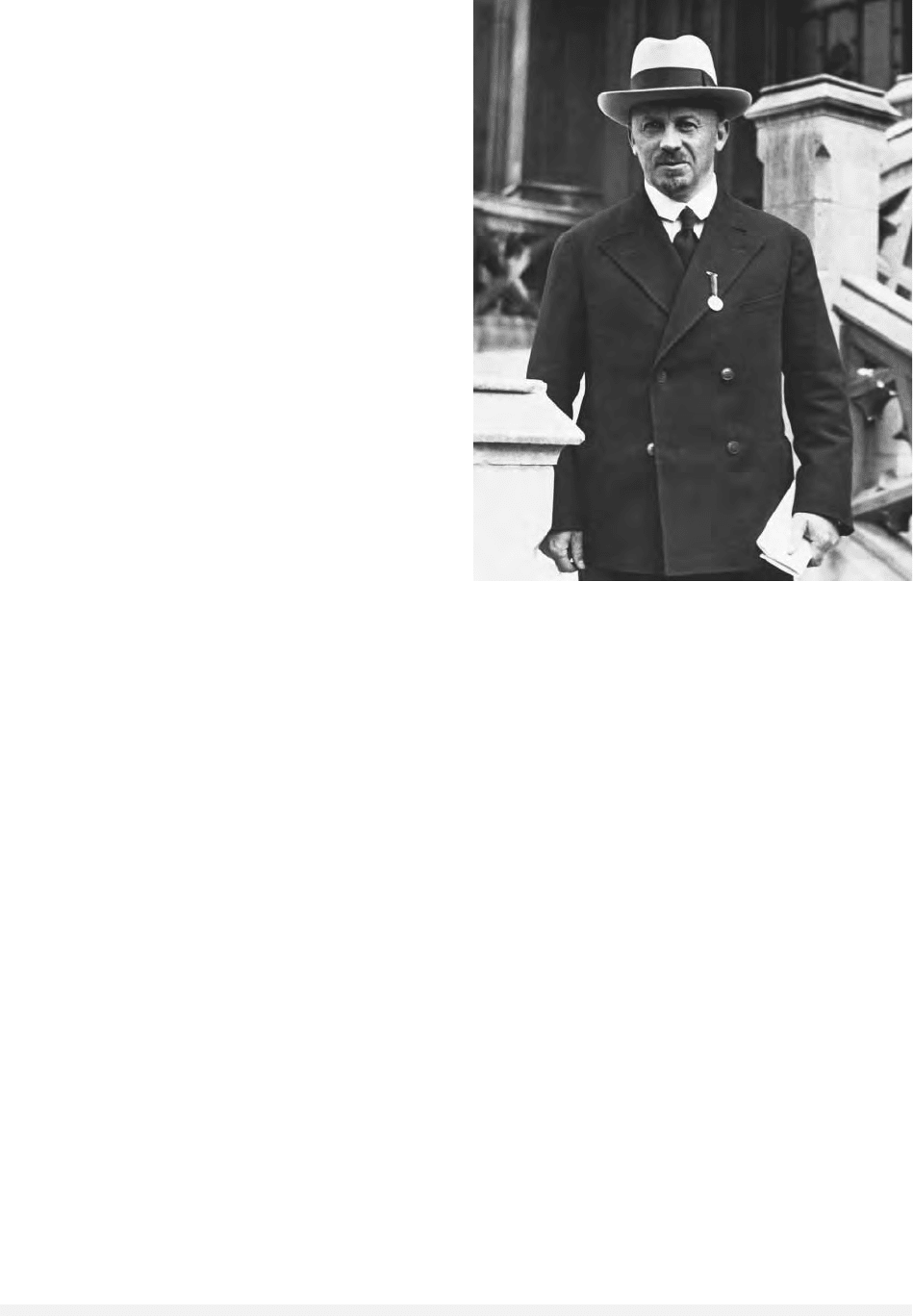Encyclopedia of Russian History
Подождите немного. Документ загружается.


persuasiveness to objections from American con-
servatives. Soviet backing for the 1973 attack on
Israel and for armed takeovers in Africa discredited
the U.S. public’s faith in the sincerity of the Soviet
Union’s peaceful intentions. By 1979 the effort to
occupy Afghanistan, in a reprise of the Czechoslo-
vak action, landed the Soviet army in a war it
proved incapable of winning while compelling Pres-
ident Jimmy Carter to abandon arms control ne-
gotiations and to withdraw from the Moscow
Olympics. In the summer of 1980 Polish strikers
formed the movement known as Solidarity,
demonstrating to Soviet officials that Brezhnev had
bet wrongly on the combination of military ex-
pansion, improved food supplies, and increases in
the availability of consumer goods to secure the al-
legiance of workers in communist-ruled states.
Under the strain of personal responsibility for
preserving the Soviet order, Brezhnev’s health de-
teriorated rapidly after the middle 1970s. In 1976
he briefly suffered actual clinical death before be-
ing resuscitated; as a result, he was constantly ac-
companied by modern resuscitation technology
bought from the West (which had to be used more
than once). Ill health made Brezhnev lethargic; it is
unclear, however, what even a more energetic
leader could have done to solve the Soviet Union’s
problems. Despite Brezhnev’s torpor, his colleagues
within the Politburo and his loyalists, whom he
had placed in key posts throughout the apex of the
Soviet party and state, continued to see their per-
sonal fortunes tied to his leadership. He remained
in power until a final illness, which is thought to
have been brought on by exposure to inclement
weather during the 1982 celebration of the Octo-
ber Revolution anniversary.
LATER REAPPRAISAL
For Gorbachev and his adherents, Brezhnev came
to personify everything that was wrong with the
Soviet regime. The popularity of Gorbachev’s pro-
gram among Western specialists, and the interest
generated by the new leader’s dynamism after the
boring stasis of Brezhnev’s later years, precluded a
reappraisal of Brezhnev’s career until 2002, when
a group of younger scholars picked up on Brezh-
nev’s growing popularity among certain members
of the Russian population. These people remem-
bered with fondness Brezhnev’s alleviation of their
or their parents’ poverty, a relief made all the more
striking by the extreme impoverishment experi-
enced by many in the post-Soviet era. This re-
assessment may appear unwarranted to those who
prize political liberty above marginal increments in
material consumption.
See also: BREZHNEV DOCTRINE; CONSTITUTION OF 1977;
DÉTENTE; KHRUSHCHEV, NIKITA SERGEYEVICH; KOSY-
GIN, ALEXEI NIKOLAYEVICH; POLITBURO
BIBLIOGRAPHY
Anderson, Richard D., Jr. (1993). Public Politics in an Au-
thoritarian State: Making Foreign Policy in the Brezh-
nev Politburo. Ithaca, NY: Cornell University Press.
Bacon, Edwin, and Sandle, Mark, eds. (2002). Brezhnev
Reconsidered. Basingstoke, Hampshire, UK: Palgrave
Macmillan.
Breslauer, George W. (1982). Khrushchev and Brezhnev as
Leaders: Building Authority in Soviet Politics. London:
George Allen and Unwin, Publishers.
Brezhneva, Luba. (1995). The World I Left Behind, tr. by
Geoffrey Polk. New York: Random House.
Dawisha, Karen. (1984). The Kremlin and the Prague
Spring. Berkeley: University of California Press.
Dornberg, John. (1974). Brezhnev: The Masks of Power.
New York: Basic Books.
Institute of Marxism-Leninism, CPSU Central Commit-
tee. (1982). Leonid Ilyich Brezhnev: A Short Biography.
Elmsford, NY: Pergamon Press.
R
ICHARD
D. A
NDERSON
J
R
.
BRODSKY, JOSEPH ALEXANDROVICH
(1940–1996), poet, translator.
Joseph Alexandrovich Brodsky left school at
the age of fifteen, and worked in many professions,
including factory worker, morgue worker, and
ship’s boiler, as well as assisting on geological ex-
peditions. During his early years, Brodsky studied
foreign languages (English and Polish). His first
foray into poetry occurred in 1957 when Brodsky
became acquainted with the famous Russian poet
Anna Akhmatova, who praised the creativity of the
budding poet. In the 1960s Brodsky worked on
translating, into Russian, poetry of Bulgarian,
Czech, English, Estonian, Georgian, Greek, Italian,
Lithuanian, Dutch, Polish, Serbian-Croatian, and
Spanish origins. His translations opened the works
of authors such as Tom Stoppard, Thomas
Wentslowa, Wisten Oden, and Cheslaw Milosh to
Russian readers; John Donne, Andrew Marwell,
and Ewrypid were newly translated.
BRODSKY, JOSEPH ALEXANDROVICH
173
ENCYCLOPEDIA OF RUSSIAN HISTORY

On February 12, 1964, Brodsky was arrested
and charged with parasitism and sentenced to five
years deportation. In 1965, after serving eighteen
months in a labor camp in northern Russia,
protests in the USSR and abroad prompted his re-
turn from exile.
During the summer of 1972, Brodsky emi-
grated to the United States and became a citizen in
1980. Before his departure from the Soviet Union,
he published eleven poems during the period from
1962 to 1972.
By the 1960s Brodsky was still relatively un-
known in the West. “Cause of Brodsky” found
scant exposure on the pages of the emigrant press
(Russkaya mysl, Grani, Wozdushnye Puti, Posev, etc.).
Brodsky’s first collection of poems was released by
the Ardis publishing house in 1972. Throughout
the 1970s Brodsky collaborated as a literary critic
and essay writer in the New Yorker and the New York
Review of Books, and gained a wider readership in
the United States.
Brodsky taught at several colleges and univer-
sities, including Columbia University and Mount
Holyoke College. In 1987 he won the Nobel prize
for literature. He served as Poet Laureate of the
United States from 1991 to 1992.
Brodsky died in 1996 of a heart attack in his
Brooklyn apartment.
See also: DISSIDENT MOVEMENT; INTELLIGENTSIA
BIBLIOGRAPHY
Bethea, David M. (1994). Joseph Brodsky and the Creation
of Exile. Princeton, NJ: Princeton University Press.
Loseff, Lev. (1991). “Home and Abroad in the Works of
Brodskii.” In Under Eastern Eyes: The West as Reflected
in Recent Russian Emigre Writing, ed. Arnold
McMillin. Basingstoke, UK: Macmillan Press with
the SSEES University of London.
Loseff, Lev, and Polukhina, Valentina, eds. (1990). Brod-
sky’s Poetics and Aesthetics. London: Macmillan.
Polukhina, Valentina. (1989). Joseph Brodsky: A Poet for
Our Time. Cambridge, UK: Cambridge University
Press.
Polukhina, Valentina. (1992). Brodsky through the Eyes of
His Contemporaries. London: Macmillan Press.
Polukhina, Valentina. (1944). “The Myth of the Poet and
the Poet of the Myth: Russian Poets on Brodsky.” In
Russian Writers on Russian Writers, ed. Faith Wigzell.
Oxford: Berg.
M
ARIA
E
ITINGUINA
BRUCE, JAMES DAVID
(1669–1735), one of Peter the Great’s closest ad-
visers.
A man of many métiers, James David Bruce
(“Yakov Vilimovich Bruce”) served Russia over the
course of his lifetime as general, statesman, diplo-
mat, and scholar. Bruce participated in both the
Crimean and Azov expeditions. In 1698 he traveled
to Great Britain, where he studied several subjects,
including Isaac Newton’s then-avant-garde philos-
ophy of optics (i.e., that light itself is a heteroge-
neous mixture of differently refrangible rays) and
gravity (i.e., that celestial bodies follow the laws of
dynamics and universal gravitation). Upon return
to Russia, Bruce enthusiastically established the
first observatory in his native country.
In 1700, at the age of thirty-one, Bruce achieved
the rank of major general and commanded forces
in the Great Northern War against Sweden. After
a humiliating defeat by the Swedes near Narva on
November 19, 1700, after which Peter reputedly
wept, Peter vowed to improve his army and defeat
Sweden in the future. He concluded that a modern
army needed a disciplined infantry equipped with
the latest artillery (rifles). This infantry was sup-
posed to advance while firing and then charge with
fixed bayonets. (The Russian army had consisted
mostly of cavalry, its officer corps composed of for-
eign mercenaries.)
Bruce was one of the new trainers Peter em-
ployed to improve the quality of the Russian army.
On July 8, 1709, Russian artillery defeated Charles’s
army and sent it into retreat. That year Bruce was
awarded the Order of St. Andrew for his decisive
role in reforming artillery as master of ordnance in
the Great Northern War. In 1712 and 1713 Bruce
headed the allied artillery of Russia, Denmark, and
Poland-Saxony in Pomerania and Holstein. In 1717
he became a senator and president of Colleges of
Mines and Manufacture. He was also placed in
charge of Moscow print and St. Petersburg mint.
As first minister plenipotentiary at the Aland and
Nystad congresses, Bruce negotiated and signed the
Russian peace treaty with Sweden in 1721, the
same year he became count of the Russian Empire.
He retired in 1726 with the rank of field marshal.
Bruce corresponded with Jacobite kinsmen and
took pride in his Scottish ancestry. He owned a li-
brary of books in fourteen languages and was
known by many as the most enlightened man in
Russia.
BRUCE, JAMES DAVID
174
ENCYCLOPEDIA OF RUSSIAN HISTORY

See also: GREAT NORTHERN WAR; PETER I
BIBLIOGRAPHY
Chambers, Robert, and Thomson, Thomas. (1996). The
Biographical Dictionary of Eminent Scotsmen. Bristol,
UK: Thoemmes Press.
Fedosov, Dmitry. (1996). The Caledonian Connection: Scot-
land-Russia Ties, Middle Ages to Early Twentieth Cen-
tury. Old Aberdeen, Scotland: Centre for Scottish
Studies, University of Aberdeen.
Fedosov, Dmitry. (1992). “The First Russian Bruces.” In
The Scottish Soldier Abroad, ed. Grant G. Simpson. Ed-
inburgh, Scotland: John Donald.
J
OHANNA
G
RANVILLE
BRUSILOV, ALEXEI ALEXEYEVICH
(1853–1926), Russian and Soviet military figure,
World War I field commander.
Born in Tiflis (Tbilisi), Alexei Alexeyevich
Brusilov entered military service in 1871, gradu-
ated from the Corps of Pages in 1872, and com-
pleted the Cavalry Officers School in 1883. As a
dragoon officer during the Russo-Turkish War of
1877–1878, he fought with distinction in the
Trans-Caucasus. Between 1883 and 1906 he served
continuously at the Cavalry School, eventually be-
coming its commandant. Although he did not at-
tend the General Staff Academy or serve in the
Russo-Japanese War (1904–1905), he rose during
the period from 1906 to 1914 to repeated com-
mand assignments, including two postings as a
corps commander. At the outset of World War I
his Eighth Army won important successes during
its advance into Galicia and the Carpathians. Be-
tween May and July of 1916, Brusilov’s South-
western Front conducted one of the most
significant ground offensives of World War I, in
which his troops broke through the Austro-
Hungarian defenses to occupy broad expanses of
Volynia, Galicia, and Bukovina.
As supreme commander (May–July 1917) of
the Russian armies after the February Revolution,
Brusilov presided over the ill-fated summer offen-
sive of 1917. After the October Revolution, unlike
many of his colleagues, he refused to join the
counterrevolutionary cause. Instead, at the outset
of the war with Poland in 1920, he entered the Red
Army, serving the new Soviet regime in various
military capacities (including inspector general of
cavalry) until his death. A consummate cavalryman
and a flexible military professional, Brusilov saw
his primary career obligation as patriotic service to
his country, whether tsarist or revolutionary.
See also: FEBRUARY REVOLUTION; OCTOBER REVOLUTION;
RUSSO-TURKISH WARS; WORLD WAR I
BIBLIOGRAPHY
Wildman, Allan K. (1980). The End of the Russian Imper-
ial Army. Princeton, NJ: Princeton University Press.
B
RUCE
W. M
ENNING
BRYUSOV, VALERY YAKOVLEVICH
(1873–1924), poet, novelist, playwright, critic,
translator.
Born in Moscow, Valery Bryusov was an early
proponent of Symbolism in Russia. As editor of the
almanac Russkie Simvolisty (Russian symbolists,
1894–1895), Bryusov presented the first articula-
tion of the tenets of Modernism in Russia.
Bryusov’s poetry in this almanac illustrated the
points set forth in the declarations, with elements
of decadence, synaesthesic imagery, and Symbolist
motifs.
In 1899 Sergei Polyakov invited Bryusov to
participate in the founding of the Skorpion Pub-
lishing House. In addition to publishing the works
of leading Symbolists, Skorpion Publishing House
in 1904 sponsored the literary journal Vesy (The
scales), which became the leading forum for writ-
ers of that time. By 1906 Bryusov became in-
creasingly critical of writers and poets with whom
he disagreed, instituting a vitriolic polemic against
the proponents of mystical anarchism and the so-
called younger generation of Symbolists, especially
those involved with the journal Zolotoye runo (The
golden fleece).
In the 1910s Bryusov continued to work in all
aspects of artistic culture, writing plays, a novel,
and literary criticism, and engaging the Futurists
in a lively debate on poetry. In 1913 Bryusov wrote
a book of poems under the pseudonym Nelli, com-
bining an ironic life story of a tragic poet with ex-
perimental, Futurist-inspired poems. The ironic
mystification met with consternation and derision
by the Futurists.
BRYUSOV, VALERY YAKOVLEVICH
175
ENCYCLOPEDIA OF RUSSIAN HISTORY

Bryusov was an enthusiastic supporter of the
Russian Revolution, believing it to be a transfor-
mative event in history. Bryusov became a mem-
ber of the Communist Party in 1920 and was active
in Narkompros (The People’s Commissariat for En-
lightenment), serving as head of its printing and li-
brary divisions. In 1921 Bryusov organized the
Higher Institute of Literature and Art and was the
director until his death.
See also: FUTURISM; SILVER AGE
BIBLIOGRAPHY
Pyman, Avril. (1994). A History of Russian Symbolism.
New York: Cambridge University Press.
Rice, Martin. (1975). Valery Briusov and the Rise of Russ-
ian Symbolism. Ann Arbor, MI: Ardis.
M
ARK
K
ONECNY
BUCHAREST, TREATY OF
The Treaty of Bucharest brought the Turkish war
of 1806–1812 to an end. Having advanced the
Russian frontier to the Dniester River in 1792,
Catherine the Great intended to include Moldavia
and Wallachia within a Dacian Kingdom under one
of her favorites. The immediate occasion for the
war, however, were the intrigues of Napoleon’s
ambassador at Constantinople, General Horace Se-
bastiani, who dismissed two pro-Russian princes in
violation of protective rights obtained by the tsar
in 1802. Catherine’s grandson Alexander I opened
hostilities in 1806 when sixty thousand men, ini-
tially led by General Mikhail Kamensky and later
by Mikhail Kutuzov, crossed the Danube. This cam-
paign proved desultory, even though in 1807 a
Russian administration replaced the Greek Princes
nominated by the Turks. When Napoleon met Tsar
Alexander I at Tilsit (1807) and later at Erfurt
(1808) to partition the Ottoman Empire, the for-
mer was willing to concede control of both princi-
palities to Russia but was unwilling to give up
Constantinople, the ultimate prize the French em-
peror had sought. In consequence, the good rela-
tions between the two emperors deteriorated. When
it became apparent that Napoleon was planning a
coalition for an invasion of Russia in 1812, the tsar,
unwilling to fight Turks and French on two fronts,
sent a delegation under General Count Alexander
de Langeron, General Joseph Fonton, and the Russ-
ian ambassador to Constantinople, Count Andrei
Italinsky, to negotiate with the Turks in Bucharest.
The latter were represented by the Grand Vizier
Ahmed Pasha, the Chief Interpreter (Drogman)
Mehmed Said Galid Effendi, and his colleague
Demetrius Moruzi. They met at the inn of a
wealthy Armenian Mirzaian Manuc. The talks were
confrontational: the Turks unwilling to cede one
inch of territory, the Russians demanding the
whole province of Moldavia. In the end, Sir Strat-
ford Canning, a young English diplomat who re-
placed the vacationing English ambassador Sir
Robert Adair, made a diplomatic debut that earned
him a brilliant career on the eve of the Crimean
War. He argued that the Turks lacked the resources
to continue the war, while the Russians needed the
troops of Admiral Pavel Chichagov (taking over Ku-
tuzov’s command) who returned to Russia to face
the Napoleonic onslaught. In the end, Canning cited
an obscure article of the Treaty of Tilsitt (article
12) negotiated by the Russian Chancelor Peter
Rumyantsev as an acceptable compensation. This
territory, misnamed by the Russians “Bessarabia”
(a name derived from the first Romanian princely
dynasty of Wallachia, which controlled only Mol-
davia’s southern tier), advanced the Russian fron-
tier from the Dniester to the Pruth and the northern
mouth of the Danube (Kilia). This represented a
gain of 500,000 people of various ethnic stock,
45,000 kilometers, five fortresses, and 685 villages.
By sacrificing the coveted prize of both principali-
ties and withdrawing the army from Turkey, the
tsar was able to confront Napoleon on a single
front. This, according to General Langeron, made
a difference at the battle of Borodino (1812).
Not content at having saved most of the
Moldo-Wallachian provinces, the Turks, who had
no legal right to a territory over which they exer-
cised de jure suzerainty, vented their frustration by
hacking their chief interpreter Moruzi to pieces and
hanging his head at the Seraglio. From a Roman-
ian standpoint, the cession of Bessarabia to Russia
in 1812 marked a permanent enstrangement in
Russo-Romanian relations, which continued in the
early twenty-first century with the creation of a
Moldavian Republic within the Russian Common-
wealth.
See also: ROMANIA, RELATIONS WITH; RUSSO-TURKISH
WARS; TURKEY, RELATIONS WITH
BIBLIOGRAPHY
Dima, Nicholas. (1982). Bessarabia and Bukovina: The So-
viet Romanian Territorial Dispute. New York and
Boulder, CO: East European Monographs.
BUCHAREST, TREATY OF
176
ENCYCLOPEDIA OF RUSSIAN HISTORY

Florescu, Radu. (1992). The Struggle Against Russia in the
Romanian Principalities (1821–1854). Munich: Ro-
manian Academic Society.
Jewsbury, George F. (1976). The Russian Annexation of
Bessarabia 1174–1828. New York: East European
Monographs.
R
ADU
R. F
LORESCU
BUDENNY, SEMEON MIKHAILOVICH
(1883–1973), marshal of the Soviet Union.
Born near Rostov-on-Don to non-Cossack par-
ents, Budenny served in Cossack regiments dur-
ing the Russo-Japanese War and in World War I
(receiving four St. George’s Crosses for bravery as
a noncommissioned officer). Having joined the
Bolsheviks in 1918 and being an accomplished
horseman, he organized cavalry detachments
around Tsaritsyn during the civil war before creat-
ing and commanding the legendary First Cavalry
Army in actions against the Whites and the Poles.
From 1924 to 1937 he served as Inspector of Cav-
alry, reaching the exalted rank of marshal in
1935. He actively helped purge the Red Army in
1937, as commander of Moscow military district,
but the Nazi invasion revealed him to be com-
pletely out of his depth in modern, mechanized
warfare. As commander-in-chief of the South-
West Direction of the Red Army in Ukraine and
Bessarabia, Budenny was largely responsible for
the disastrous loss of Kiev in August 1941. Prob-
ably only his closeness to Josef Stalin and Kliment
Voroshilov (a legacy of his civil war service at
Tsaritsyn/Stalingrad) saved him from execution.
Instead, he was removed from frontline posts in
September 1941, becoming commander of cavalry
in 1943 and deputy minister of agriculture, in
charge of horse breeding. He was a member of the
Central Committee of the Communist Party of the
Soviet Union from 1939 to 1952. Virtually une-
ducated but with enormous charisma (and even
more enormous moustaches), Budenny became a
folklore figure, a decorative accoutrement to the
grey men of the postwar Soviet leadership, and a
museum piece. Present at all parades and state oc-
casions, bedecked with medals and orders, he was
a living relic of the heroic days of the Civil War.
Several thousand streets, settlements, and collec-
tive farms were named in his honor, as was a
breed of Russian horses. He lived out his last years
quietly in Moscow, pursuing equestrian interests.
See also: CIVIL WAR OF 1917–1922; COSSACKS; WORLD
WAR II
BIBLIOGRAPHY
Budyonny, Smeyon. (1972). The Path of Valour. Moscow:
Progress Publishers.
Vitoshnov, Sergei. (1998). Semen Budennyi. Minsk:
Kuzma.
J
ONATHAN
D. S
MELE
BUKHARA
Established in the sixteenth century, the Bukharan
khanate maintained commercial and diplomatic
contact with Russia. Territorial conflicts with
neighboring Khiva and Kokand prevented forma-
tion of a united front against Russia’s encroach-
ment in the mid-nineteenth century.
War from 1866 to 1868 ended with Russia’s
occupation of the middle Zarafshan River valley,
including Samarkand, and the grant of trading
privileges to Russian merchants. The 1873 treaty
opened the Amu Darya to Russian ships; pledged
the emir to extradite fugitive Russians and abolish
the slave trade; and ceded Samarkand, leaving Rus-
sia in control of the water supply of the lower
Zarafshan, including that of the capital.
Bukhara as a Russian protectorate was slightly
larger than Great Britain and Northern Ireland,
with a population of two and a half to three mil-
lion. Urban residents comprised 10 to 14 percent
of the total; the largest town was the capital, with
population of 70,000 to 100,000. The dominant
ethnic group was the Uzbeks (55–60%), followed
by the Tajiks (30%) and the Turkmen (5–10%).
Bukhara was ruled by an hereditary autocratic
emir. Muzaffar ad-Din (1860–1885) was succeeded
by his son Abd al-Ahad (1885–1910) and the lat-
ter’s son Alim (1910–1920).
In reducing Bukhara to a wholly dependent but
internally self-governing polity, Russia aimed to
acquire a stable frontier in Central Asia, to prevent
Britain alone from filling the political vacuum be-
tween the two empires, and to avoid the burdens
of direct rule. This policy succeeded for half a cen-
tury. After 1868 no emir contemplated using his
army against his protector; in 1873 Britain and
Russia recognized the Amu Darya as separating a
Russian sphere of influence (Bukhara) from a
British sphere (Afghanistan); and the emirs main-
tained sufficient domestic order.
BUKHARA
177
ENCYCLOPEDIA OF RUSSIAN HISTORY

Russia’s impact increased over the years. In the
mid-1880s Bukhara’s capital was connected by
telegraph with Tashkent; a Russian political
agency was established; and the Central Asian Rail-
road was built across the khanate. In the latter part
of the 1880s three Russian urban enclaves, and a
fourth at the turn of the century, were established;
by the eve of World War I they contained from
thirty-five to forty thousand civilians and soldiers.
In 1895 the khanate was included in Russia’s cus-
toms frontier, and Russian troops and customs
officials were stationed along the border with
Afghanistan.
Russo-Bukharan trade increased sixfold from
the coming of the railroad to 1913. Production of
cotton, which represented three-fourths of the
value of Bukhara’s exports to Russia, expanded two
and a half times between the mid-1880s and the
early 1890s, grew slowly thereafter, but doubled
during World War I. Unlike Turkestan, the khanate
remained self-sufficient in foodstuffs.
After the fall of the tsarist regime, Emir Alim
resisted pressure for reforms from the Provisional
Government and the Bukharan Djadids (moderniz-
ers). With the Bolsheviks in control of the railroad,
the Russian enclaves, and the water supply of his
capital from December 1917, the emir maintained
strained but correct relations with the Soviet gov-
ernment during the Russian civil war.
In the late summer of 1920 the Red Army over-
threw Alim. A Bukharan People’s Soviet Republic,
led by Djadids, was proclaimed. Russia renounced
its former rights, privileges, and property in
Bukhara, but controlled the latter’s military and
economic affairs. The Djadids were purged in 1923,
and the following year the Bukharan People’s So-
viet Republic was divided along ethnic lines between
the newly formed Uzbek and Turkmen Soviet So-
cialist Republics.
See also: CENTRAL ASIA; KHIVA; NATIONALITIES POLI-
CIES, SOVIET; NATIONALITIES POLICIES, TSARIST;
TURKMENISTAN AND TURKMEN; UZBEKISTAN AND
UZBEKS
BIBLIOGRAPHY
Becker, Seymour. (1968). Russia’s Protectorates in Central
Asia: Bukhara and Khiva, 1865–1924. Cambridge,
MA: Harvard University Press.
S
EYMOUR
B
ECKER
BUKHARIN, NIKOLAI IVANOVICH
(1888–1938), old Bolshevik economist and theo-
retician who was ousted as a Rightist in 1929 and
executed in 1938 for treason after a show trial.
The son of Moscow schoolteachers, raised in
the spirit of the Russian intelligentsia, Nikolai
Ivanovich Bukharin was a broadly educated and
humanist intellectual. Radicalized as a high school
student during the 1905 Revolution, he was drawn
to the Bolshevik faction, which he formally joined
in 1906. He enrolled at Moscow University in 1907
to study economics, but academics took second
place to party activity. He rose rapidly in the
Moscow Bolshevik organization, was arrested sev-
eral times, and in 1911 fled abroad, where he re-
mained until 1917. These six years of emigration
strengthened Bukharin’s internationalism; he ma-
tured as a Marxist theorist and writer and became
known as a radical voice in the Bolshevik party.
After a year in Germany, he went to Krakow in
1912 to meet Vladimir Lenin, who invited him to
write for the party’s publications. Bukharin settled
in Vienna, where he studied and drafted several the-
oretical works. Expelled to Switzerland at the be-
ginning of World War I, he supported Lenin’s
radical antiwar platform, continuing his activities
in Scandinavia and then New York City.
When revolution broke out in Russia in early
1917, Bukharin hastened home. Arriving in May,
he immediately took a leading role in the Moscow
Bolshevik organization, which was dominated by
young radicals. His militant stance brought him
close to Lenin. In July 1917 he was elected a full
member of the Central Committee, and in Decem-
ber he was appointed editor of the party newspaper,
Pravda. Bukharin opposed the peace negotiations
with the Central Powers at Brest-Litovsk and headed
the Left Communists who called for a revolution-
ary war against capitalism; later he also opposed
Lenin’s view that state capitalism would be a step
forward for Russia. In mid-1918, ending his oppo-
sition, he resumed his party positions as the bur-
geoning civil war led to war communism and
rebellion by the Left Socialist Revolutionaries. In
1919, when a five-man Politburo was formally es-
tablished, Bukharin became one of three candidate
members and also became deputy chairman of the
newly established Comintern. Serving in various ca-
pacities during the civil war, Bukharin also pub-
lished extensively: including Imperialism and World
Economy (1918), the popularizing and militant ABC
of Communism (1920, with Yevgeny Preobrazhen-
BUKHARIN, NIKOLAI IVANOVICH
178
ENCYCLOPEDIA OF RUSSIAN HISTORY

sky); Economics of the Transition Period (1920),
which celebrated the statization of the economy un-
der War Communism but also began to explore
how to build a socialist society after the revolution;
and Historical Materialism (1921), a major analysis
of Marxism in the twentieth century.
After Lenin introduced the New Economic Pol-
icy in 1921, debate swirled around the question of
the relative importance that should be accorded in-
dustry and agriculture to achieve economic devel-
opment within the framework of a socialist
economy. Leon Trotsky and the Left Opposition fa-
vored rapid industrialization at the expense of agri-
culture, in what Preobrazhensky termed “primitive
socialist accumulation.” Bukharin, disavowing the
illusions of War Communism, emphasized the need
to find an evolutionary path to socialism based on
a strong alliance with Russia’s peasant majority
and invoked Lenin’s last writings to legitimize this
position. He argued that forcibly appropriating
agricultural surpluses would ultimately lead to the
disintegration of agriculture because peasants
would no longer have an incentive to produce.
While agreeing that industrialization was ab-
solutely critical for the construction of socialism,
he favored a gradual approach. Bukharin’s path to
socialism relied upon a growing consumer market,
possible only if there were private merchants to
contribute to the growth of domestic trade. He ar-
gued for policies that would produce balanced
growth at a moderate tempo, speaking of growing
into socialism through exchange.
In the mid-1920s Bukharin aligned himself
with the Stalinist majority against the Left, be-
coming a full member of the Politburo in 1924,
and played a major role in the government. He was
the architect of the pro-peasant policies introduced
in 1925 and urged peasants to “enrich yourselves,”
a phrase that would later be used against him. As
editor of Pravda and other party publications, and
a member of the Institute of Red Professors,
Bukharin moved easily in the world of NEP intel-
lectuals and artists and authored government poli-
cies favoring artistic freedom. He became head of
the Comintern in 1926 after the ouster of Grigory
Zinoviev and saw the collapse of his policy of co-
operation with the Chinese Nationalists. In the
same period, Bukharin strongly attacked the Left
Opposition and helped achieve its total ouster from
power in the fall of 1927.
Bukharin supported the 1927 decision of the Fif-
teenth Party Congress to adopt a five-year plan for
Soviet industrialization, but he and the gradualist
policies he advocated fell victim to the radical and vi-
olent way Josef Stalin carried out the plan. Bukharin
opposed Stalin’s harsh measures against the peasants
after the amount of grain marketed fell off sharply.
In September he published “Notes of an Economist,”
criticizing efforts to inflate the industrial goals of the
plan and defending the idea of balanced growth; it is
impossible, he said, “to build today’s factories with
tomorrow’s bricks.” Stalin and his allies counterat-
tacked, labeling Bukharin, Alexei Rykov, and Mikhail
Tomsky the “Right Opposition.” His power already
undercut by the end of 1928, Bukharin was removed
formally from the Politburo, the Comintern, and ed-
itorship of Pravda during 1929 and systematically
vilified. In limbo for the next four years after half-
hearted recantations, horrified by the destruction vis-
ited on the peasantry by collectivization, he served
as research director for the Supreme Economic Coun-
cil and its successor and wrote extensively on cul-
ture and science. In the era of partial moderation
from 1934 to 1936, Bukharin became editor of the
government newspaper, Izvestiya, participated in the
commission to prepare a new Soviet constitution,
and wrote about the danger of fascism in Europe.
BUKHARIN, NIKOLAI IVANOVICH
179
ENCYCLOPEDIA OF RUSSIAN HISTORY
Communist leader Nikolai Bukharin in London, June 1931.
© H
ULTON
-D
EUTSCH
C
OLLECTION
/CORBIS

The Great Purges ended the domestic truce. Bukharin
was arrested in February 1937. In March 1938, along
with the Right Opposition, he was tried for treason
and counterrevolution in the last great show trial,
the Trial of the Twenty-One, where he was the star
defendant. Bukharin confessed to the charges against
him, probably to save his young wife Anna Larina
and their son Yuri (born 1934), and he was executed
immediately. In the Khrushchev years, Bukharin
came to symbolize an alternative, non-Stalinist path
of development for the Soviet Union. He was reha-
bilitated in 1988, and Larina made public his last
written work, a letter to future party leaders, that
she had preserved by memory during years of im-
prisonment.
See also: LEFT OPPOSITION; LEFT SOCIALIST REVOLUTION-
ARIES; NEW ECONOMIC POLICY; PURGES, THE GREAT;
WAR COMMUNISM
BIBLIOGRAPHY
Bergmann, Theodor; Schaefer, Gert; and Selden, Mark,
eds. (1994). Bukharin in Retrospect. Armonk, NY:
M.E. Sharpe.
Bukharin, Nikolai. (1998). How It All Began. New York:
Columbia University Press.
Cohen, Stephen F. (1973). Bukharin and the Bolshevik Rev-
olution: A Political Biography, 1888–1938. New York:
Oxford University Press.
Haynes, Michael. (1985). Nikolai Bukharin and the Tran-
sition from Capitalism to Socialism. London: Croom
Helm.
Heitman, Sidney. (1969). Nikolai I. Bukharin: A Bibliog-
raphy, with Annotations. Stanford, CA: Hoover In-
stitution.
Kemp-Welch, A., ed. (1992). The Ideas of Nikolai Bukharin.
New York: Oxford University Press.
Larina, Anna (1993). This I Cannot Forget: The Memoirs of
Nikolai Bukharin’s Widow. New York: Norton.
Lewin, Moshe. (1974). Political Undercurrents in Soviet
Economic Debates from Bukharin to the Modern Re-
formers. Princeton, NJ: Princeton University Press.
Medvedev, Roy A. (1980). Nikolai Bukharin: The Last
Years. New York: Norton.
C
AROL
G
AYLE
W
ILLIAM
M
OSKOFF
BUKOVINA
Bukovina is a region that straddles north-central
Romania and southwestern Ukraine. First records
of the region date back to the fourteenth century,
when the whole territory was a constituent part
of the Moldovan Principality.
From 1504, the region was drawn under indi-
rect Ottoman rule. However, following the Russo-
Turkish war of 1768–1774, the Hapsburg Empire
annexed the region, in accordance with the 1775
Convention of Constantinople.
During the initial stages of Austrian rule,
Bukovina’s population expanded rapidly. The re-
gion’s reputation for religious toleration and re-
laxed feudal obligations saw a wave of German,
Polish, Hungarian, Ukrainian, and Romanian im-
migrants flood into the area.
The collapse of the Austro-Hungarian Empire
in the aftermath of World War I gave rise to a brief
period of dispute concerning rights to the region,
with both Romania and briefly independent
Ukraine claiming sovereignty. The Treaty of Saint
Germain awarded the territory to a newly enlarged
Romania.
Control over the region shifted following the
enactment of the clandestine Ribbentrop-Molotov
pact, as the Soviet Union seized northern Bukov-
ina (to the Sereth River) on June 29, 1940. This
move precipitated an exodus of the region’s Ger-
man settlers.
Germany’s attack on the Soviet Union in 1941
saw the whole territory temporarily revert to Ro-
mania. Bukovina’s sizable Jewish population suf-
fered during this period. However, the region was
retaken by advancing Soviet troops, and in Sep-
tember 1944 northern Bukovina was officially in-
corporated into the Ukrainian Soviet Socialist
Republic.
After a period of territorial stability under
Communist rule, focus on the area returned dur-
ing the 1990s. With an estimated 135,000 ethnic
Romanians living in Ukrainian Bukovina, tentative
calls were made by the Romanian government for
a reversion to territorial arrangements that had ex-
isted prior to the Ribbentrop-Molotov pact. The
Ukrainian government’s unwillingness to engage
Romanian demands meant the issue initially
reached a stasis. However, Romania’s application
to join NATO forced a resolution of the dispute and,
as such, a 1997 treaty mutually recognized the ter-
ritorial integrity of the two states.
See also: MOLDOVA AND MOLDOVANS; UKRAINE AND
UKRAINIANS
BUKOVINA
180
ENCYCLOPEDIA OF RUSSIAN HISTORY

BIBLIOGRAPHY
Fischer-Galati, Stephen. (1991). Twentieth Century Ruma-
nia. New York: Columbia University Press.
Roper, Steven D. (2000). Romania: The Unfinished Revo-
lution. Amsterdam: Harwood Academic Publishers.
J
OHN
G
LEDHILL
BULGAKOV, MIKHAIL AFANASIEVICH
(1891–1940), twentieth-century novelist, journal-
ist, short story writer, and playwright; author of
internationally acclaimed novel Master and Mar-
garita.
Mikhail Afanasievich Bulgakov was born in
Kiev. He graduated from the Kiev University Med-
ical School in 1916 and married Tatiana Lappa, his
first of three wives. He practiced medicine in
provincial villages, then in Kiev, where he witnessed
the outbreak of the Russian Civil War and strug-
gled with morphine addiction. In 1920 he aban-
doned medicine for a writing career and moved to
Vladikavkaz, Caucasus, where he wrote feuilletons
and studied theater.
Bulgakov moved to Moscow in 1921. There
his troubles with censorship began. His satirical
(patently science fiction) novel Heart of a Dog
(Sobache serdtse) was deemed unpublishable. His
play Days of the Turbins (Dni Turbinykh), based on
his autobiographical novel White Guardu (Belaya
Gvardiya), premiered in 1926 and was banned af-
ter its 289th performance (although it supposedly
numbered among Josef Stalin’s favorite plays).
Subsequent plays were banned much earlier in the
production process. His short story “Morphine”
(1927) was his last publication in his lifetime. In
1930 he wrote a long letter (his second) to the So-
viet government requesting permission to emigrate.
He received in response a telephone call from Stalin,
who offered him an assignment as assistant pro-
ducer at the Moscow Art Theater. Although not
subjected to forced labor or confinement, Bulgakov
hardly enjoyed privilege. His work remained un-
published and unperformed. His attempts to ap-
pease the censors by tackling relatively safe subjects
(historical fiction and adaptations) proved futile.
Bulgakov’s novel Master and Margarita was
written between 1928 and 1940. Resonant with the
influence of Nikolai Gogol, it concerns the Devil,
who, disguised as a professor, travels to Moscow
to wreak havoc. This exuberantly irreverent work
swirls with fierce wit, narrative inventiveness, and
a myriad of historical, literary, and religious refer-
ences.
Bulgakov’s last play, Batum (1939), written in
honor of Stalin’s sixtieth jubilee, was banned. Bul-
gakov died of kidney disease in 1940.
See also: GOGOL, NIKOLAI VASILIEVICH; MOSCOW ART
THEATER; THEATER
BIBLIOGRAPHY
Bulgakov, Mikhail. (1987). Heart of a Dog, reprint ed., tr.
Mirra Ginsburg. New York: Grove.
Bulgakov, Mikhail. (1996). The Master and Margarita,
reprint ed., tr. Diana Burgin and Katherine Tiernan
O’Connor. New York: Vintage.
Milne, Lesley. (1990). Bulgakov: A Critical Biography.
Cambridge, UK: Cambridge University Press.
Proffer, Ellendea. (1984). Bulgakov: Life and Work. Ann
Arbor, MI: Ardis.
D
IANA
S
ENECHAL
BULGAKOV, SERGEI NIKOLAYEVICH
(1871–1944), political economist, philosopher, and
theologian, whose life and intellectual evolution
were punctuated by sharp breaks and shifts in
worldview.
Sergei Bulgakov was born into the clerical es-
tate. His father was a rural clergyman in Livny (Orël
province); his mother, of gentry background. Like
Nikolai Chernyshevsky and Nikolai Dobrolyubov a
generation earlier, Bulgakov lost his faith at age
fourteen and transferred from the seminary to the
secular gymnasium at Elets, and then to Moscow
University, where he studied political economy. His
book On Markets in Capitalist Conditions of Produc-
tion (1897) established him, together with Nikolai
Berdyayev, Peter Struve, and Mikhail Tugan-
Baranovsky, as one of Russia’s foremost Legal
Marxists. While researching his doctoral thesis
(“Capitalism in Agriculture”) in Europe, Bulgakov
experienced a spiritual crisis, breaking down in pi-
ous tears before Raphael’s canvas of the Sistine
Madonna in Dresden. Upon his return to Russia, he
spearheaded the movement from Marxism to ideal-
ism (including among others Berdyayev, Semen
Frank, and Struve). Over the next twenty years he
became a key participant in the seminal collections
BULGAKOV, SERGEI NIKOLAYEVICH
181
ENCYCLOPEDIA OF RUSSIAN HISTORY

of articles—Problems of Idealism (1902), Landmarks
(1909), From the Depths (1918)—that charted the
collective spiritual evolution of an important seg-
ment of the Russian intelligentsia. Bulgakov’s ide-
alism translated into political involvement in the
Union of Liberation (founded in Switzerland in
1903) and included the drafting of the Cadet (Con-
stitutional Democrat) party’s agrarian program.
During the Revolution of 1905, Bulgakov founded
a small but intellectually sophisticated Christian
Socialist party and was elected to the Second Duma.
Like his fellow liberals and radicals, Bulgakov
experienced severe disappointment following Peter
Stolypin’s June 3 coup, formulated in his article in
Vekhi, criticizing the intelligentsia. But by 1912 he
had regained his sense of direction, finally com-
pleting his doctoral dissertation in a completely
new tone. Philosophy of Economy: The World as
Household (translated into English for the first time
in 2000) is a work of social theory, and fully part
of the “revolt against positivism” (H. Stuart
Hughes) characteristic of European social thought
in the period from 1890 to 1920. The book estab-
lished Bulgakov’s prominence as a thinker of the
Russian Silver Age. In Philosophy of Economy and his
next major work, The Unfading Light (1917), Bul-
gakov became a religious philosopher, bringing the
insights of Orthodox Christianity, and particularly
the concept of Sophia, the Divine Wisdom, to bear
on problems of human dignity and economic ac-
tivity.
Following the February Revolution, Bulgakov
became a delegate to the All-Russian Council of the
Orthodox Church; in 1918 he was ordained as a
priest. Bulgakov was among the two hundred or
so intellectuals Vladimir Lenin ordered shipped out
of the new Soviet Union, across the Black Sea to
Istanbul, in 1922. In his “second life,” first in Prague
and then in Paris, Bulgakov became arguably the
twentieth century’s greatest Orthodox theologian,
crafting two theological trilogies modeled on the
pattern of the liturgy: the “major” (e.g., Agnets
Bozhy) and the “minor.” Bulgakov was founder and
dean of the St. Sergius Theological Academy in Paris
and active in the ecumenical movement, including
the Brotherhood of St. Alban’s and St. Sergius and
the Russian Christian Student Movement. Sophia,
the Divine Wisdom, became a unifying principle in
his writing, even leading to the development of a
doctrine known as Sophiology. A tragic contro-
versy over Sophia erupted in 1935; Bulgakov’s
views were condemned by both the Soviet Ortho-
dox Church and the Synod of the Orthodox Church
in Exile in Czechoslovakia. Bulgakov’s final work
was a commentary on the Apocalypse of St. John
the Divine. In 1944 he died of throat cancer in Paris.
Banned for seventy years in the Soviet Union,
the writings of Bulgakov and his fellow Silver Age
philosophers experienced a resurgence of popular-
ity beginning in 1989.
See also: BERDYAYEV, NIKOLAI ALEXANDROVICH; CON-
STITUTIONAL DEMOCRATIC PARTY; SILVER AGE
BIBLIOGRAPHY
Evtuhov, Catherine. (1997). The Cross and the Sickle: Sergei
Bulgakov and the Fate of Russian Religious Philosophy,
1890–1920. Ithaca, NY: Cornell University Press.
Valliere, Paul. (2000). Modern Russian Theology: Bukharev,
Soloviev, Bulgakov: Orthodox Theology in a New Key.
Grand Rapids, MI: Eerdmans.
C
ATHERINE
E
VTUHOV
BULGANIN, NIKOLAI ALEXANDROVICH
(1895–1975), political and military leader.
Nikolai Bulganin was a marshal of the Red
Army who rose to the position of Soviet Prime Min-
ister (1955–1958) under Nikita Khrushchev. Bul-
ganin made his career mainly as a security and
military official, but he was also an urban admin-
istrator. As mayor of Moscow (1931–1937) at a
time when the capital was undergoing rapid ex-
pansion, he collaborated closely with Khrushchev
in the construction of such enduring symbols
of Stalinist urbanization as the Moscow metro.
Bulganin’s career benefited from the purges
(1937–1938). Despite his lack of military training,
Josef Stalin actively promoted him as a party
commissar to oversee the military. He eventually
joined Stalin’s war cabinet in 1944. In 1947 he suc-
ceeded Stalin as minister for the armed forces and
was promoted to marshal. A year later he joined
the Politburo. Shortly after Stalin’s death (1953),
he was appointed minister of defense. In the ensu-
ing political confrontation with secret police chief
Lavrenti Beria, Bulganin sided with his friend
Khrushchev, ensuring the military’s loyalty. Bul-
ganin’s subsequent support for Khrushchev against
Georgy Malenkov, who was advocating reduced
spending on heavy industry, led to Bulganin’s ap-
pointment as prime minister. In this post he ac-
tively supported Khrushchev’s attempts to defuse
BULGANIN, NIKOLAI ALEXANDROVICH
182
ENCYCLOPEDIA OF RUSSIAN HISTORY
